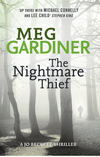Buch lesen: «The Nightmare Thief»

The Nightmare Thief
Meg Gardiner

Dedication
For Nancy Fraser
Contents
Cover
Title Page
Dedication
Chapter 1
Chapter 2
Chapter 3
Chapter 4
Chapter 5
Chapter 6
Chapter 7
Chapter 8
Chapter 9
Chapter 10
Chapter 11
Chapter 12
Chapter 13
Chapter 14
Chapter 15
Chapter 16
Chapter 17
Chapter 18
Chapter 19
Chapter 20
Chapter 21
Chapter 22
Chapter 23
Chapter 24
Chapter 25
Chapter 26
Chapter 27
Chapter 28
Chapter 29
Chapter 30
Chapter 31
Chapter 32
Chapter 33
Chapter 34
Chapter 35
Chapter 36
Chapter 37
Chapter 38
Chapter 39
Chapter 40
Chapter 41
Chapter 42
Chapter 43
Chapter 44
Chapter 45
Chapter 46
Chapter 47
Chapter 48
Chapter 49
Chapter 50
Chapter 51
Chapter 52
Chapter 53
Chapter 54
Chapter 55
Chapter 56
Chapter 57
Chapter 58
Chapter 59
Chapter 60
Chapter 61
Chapter 62
Acknowledgements
About the Author
Also by Meg Gardiner
Copyright
About the Publisher
Chapter 1
The young trader stumbled from the trees like a scarecrow running on legs of straw. Her suit was muddy, her blouse torn, her sleek Asian hair matted with pine needles. She ran into the street directly in front of Autumn Reiniger’s BMW.
Autumn braked. “Oh, man.”
The trader glanced at her but didn’t break stride. With one arm she clutched a battered lockbox. The other arm she cradled to her chest, protecting what looked to Autumn like a broken wrist.
This was the place. Fun city.
The trader ran across the street to the driveway of Peter Reiniger’s palatial home. She was the last to emerge from the eucalyptus grove at the edge of the Presidio. The others huddled on the driveway. Beside them, Reiniger sat on the tailgate of a Mercedes SUV.
Autumn got out of her car. She took a step, but Reiniger gestured for her to stay put.
The trader swayed to a stop. Nakamura, that was her name— Autumn recognized her from one of her father’s glossy corporate brochures. Chest heaving, the woman dropped to her knees.
She set down the lockbox. After long seconds she raised her gaze to Reiniger.
Her silence made Autumn’s skin tingle. Nakamura was controlling pain and raw emotion. And she was unintimidated—it was stirring. She knelt on the driveway, black hair falling across her face, and she held Peter Reiniger’s gaze. With her good arm she fumbled open the lockbox. Inside, hundreds of multicarat stones glittered like tears.
“I win,” she said.
A hush pressed upon the street. Birdsong, wind through the trees, traffic down the hill along the San Francisco waterfront, all ebbed. Reiniger climbed off the tailgate.
“And?” he said.
She dug her hand into the stones and clutched a fistful. “Ransom my team.”
The people huddled around the SUV cheered. Nakamura let the stones—cubic zirconia, playtime diamonds—cascade back into the box.
Reiniger pulled her to her feet. “You okay?”
She wobbled, but smiled. “You owe me a raise.”
A medic jogged up. “Let’s take a look at that arm.”
Her colleagues thronged her. Autumn grinned and applauded. The woman was tough. From the roof of the Mercedes SUV, a cameraman panned the scene, catching their glee.
And . . . cut. Cue the music from Chariots of Fire. Autumn strolled toward her dad, hands in the back pockets of her jeans.
The game runner got to Reiniger first. “We’ll edit the video and burn copies for everybody.”
Reiniger nodded. “We’ll stream it at our board meeting.”
The game runner, a black guy with the hard fitness of a running back, poured antiseptic on a gauze pad and handed it to Reiniger. “Clean up.”
Cleaning up was what Edge Adventures did. Absolutely. Reiniger pushed up the sleeve of his sweatshirt. Scrapes covered his elbow. This kidnap scenario looked to Autumn like it had been rowdier than most.
She took the gauze pad from him and dabbed at the scrapes. “Messy.”
“Realistic,” he said. “The screaming’s all part of the game.” Only at team-building weekends run for Reiniger Capital.
“It’s how I find out what my people are made of,” he said. Autumn had heard it from her dad before: Running a hedge fund could be risky and stressful, but Edge Adventures helped people find what was really inside. Toughness. Spirit. His staff now clustered around a cooler, beer bottles in hand, exhausted and proud. Two of them grabbed the lockbox and poured the fake diamonds over Nakamura’s head, as if dumping a bucket of ice on the winning coach at a football game.
Edge Adventures didn’t simply sell excitement. They showed clients the light.
Edge created urban reality games, role-playing scenarios that took clients into an imagined demimonde of crime and rescue. They threw people in the soup.
Edge offered kidnappings, manhunts by bounty hunters, and even a night locked in a morgue—all in all, the chance to face your demons and to act out fantasies of crime and danger. Today, Edge had grabbed Peter Reiniger’s team off a street in downtown San Francisco for a simulated heist scenario.
Coates, the game runner, checked Reiniger’s elbow. “It’s fine.”
“Don’t worry, I’m not going to ask for a discount,” he said.
Autumn saw a quick jab of anxiety on Coates’s face, and thought: And he’s not going to sue you.
“We’re cool,” Reiniger said. “This was what my daughter here calls sick fun.”
Autumn rolled her eyes.
Coates slapped Reiniger on the back. “As always, we’re happy to have your business.”
“However, I do want to speak to you about our run-in with the police. See me inside in five minutes.”
Frowning, Coates went to help the Edge staff load their gear into the SUV—ropes, emergency flares, and replica firearms that looked mean as all get-out.
Reiniger turned to Autumn. “You’re half an hour late.”
“My car isn’t working right. There’s a light on the dashboard.”
“Which light?”
“The one that tells you it’s time to buy a new car.”
“You mean 'Service’?”
Laughing, she stretched and kissed his cheek. “Joking, Dad.”
“Sure you are.”
Autumn was a month shy of turning twenty-one. She bounced on her toes, knowing he would get the message. Big birthday. Better think big gifts.
She nodded at the scene on the driveway. “You wanted me to watch the grand finale why, exactly?”
“To see how things work.”
“Work? You’re playing Ocean’s Eleven. And Name That Phobia.” She raised an eyebrow. “Don’t deny it.”
“I don’t.”
“But you wanted me to sit on the sidelines. And what, cheer?” She crossed her arms. “Put Band-Aids on their boo-boos?”
He crooked his index finger and beckoned her to follow him. Inside, the house was gauzy with sunshine. The view through the living room to the terrace showed windswept Monterey pines and the blue waters of the bay.
Reiniger said, “Hold out your hand.”
Lightness, anticipation, winged through her. About time. She raised her hand. And Reiniger slapped a heavy manila envelope into her palm. She eyed him uncertainly.
“Open it,” he said.
Autumn tore open the envelope. Inside was a memo. It was stamped, in red, CLASSIFIED.
From: Edge Adventures
To: Autumn Reiniger
Re: Your assignment
“Welcome to adulthood,” he said. “You bought me a game?”
OUTLAW is an urban reality scenario that off ers a variety of roles for you and your closest friends. Crime syndicate boss, bounty hunter, prison escapee. Edge employees will take other roles and run the scenario.
“A three-day weekend, for six of you.” Reiniger smiled. “It’s a designer crime spree.”
Her confusion began to clear. Ultra-deluxe. Outlaw. Prison break.
“Oh my God. Do we get a speedboat?” she said.
“If you want one.”
Helicopter rescue.
“Dad—is this for real?”
Hunt down the crime boss, or BE the boss and escape the long arm of the law.
“And this is totally plush, right? No team building. No 'get in touch with your inner hero.’ ” Her voice turned hard. “No 'fight your demons.’ Just fun. And five star. Right?”
He pointed to the location of their syndicate headquarters: the Mandarin Oriental.
“Happy birthday,” he said.
She threw her arms around his neck and kissed his cheek.
As Autumn hugged him, a Corvette revved into the driveway. Reiniger patted her on the back. “Go on.”
It was her boyfriend. She ran outside, smiling like a cat that had just cornered a mouse.
Fight your demons.
She would know about phobias, Reiniger thought. Too bad hers didn’t include fear of shopping.
His daughter was adorable: quick, clever, winning. And such a pretty girl, with the tumbling brown curls of a Victorian aristocrat. He’d never been able to deny her anything. She always wore him down. Her relentlessness was a quality he admired. So why did he get a nagging feeling of unease when he gave in?
Because he had acquiesced to assuage her heartbreak when he and her mother divorced. And to salve her grief when her mother died. He had lavished her with gifts. And what did that get him? Demands for more.
Autumn had the BMW. She had an apartment he’d bought her in the city. She had a spot at the University of San Francisco, a college to which he gave generous donations. And she regarded classes as a hindrance to her tanning schedule.
No team building. No “get in touch with your inner hero.”
But heroism was precisely what he wanted her to discover.
Nothing compared to going out on the rim and facing your deepest fears. And Edge offered a red-in-tooth-and-claw experience, rarely found in twenty-first-century America, of feeling truly, deeply, alive. Its full-immersion adventures were the modern world’s closest equivalent to primitive initiation rituals.
He paid through the nose, but it was worth it.
For years Autumn had asked to take part in an Edge scenario. And, abruptly, Reiniger didn’t want to give her the thrill she coveted. He wanted to give her a wake-up call. She had peculiar fears. She wielded them as a weapon to manipulate him whenever her sense of entitlement was threatened. It was time to quash them.
Coates rapped on the open door. “You got a question about the SFPD?”
Reiniger waved him in. “Yeah. Why did they show up at exactly the wrong moment today?”
Coates was a former Oakland cop. He was Mr. Law-and-Order and always alerted the authorities before a scenario was about to run. If a client was going to be grabbed off the street, Edge wanted the cops to know it was a party, not an abduction.
But the San Francisco police had nearly derailed today’s scenario, right at the start. As Nakamura was being dragged toward the kidnap van, an SFPD patrol car had screeched up, lights flashing.
Coates shook his head. “Pure chance. No way to grab people off the street without being seen.” He eyed Reiniger warily. “They left. I squared it.”
“That cruiser arrived thirty seconds into the kidnap. Almost like they had a heads-up.”
Coates stiffened. “From Edge? No way. We have zero motive to stall a scenario.”
He glanced out the door at Reiniger’s team.
“It wasn’t one of them,” Reiniger said. “They didn’t know when the kidnap was going down.”
“So it was nobody. Like I said—chance.”
Reiniger wasn’t convinced, but let it go. “I want to ask you something else.” He checked that Autumn was out of earshot outside. “I want to add a layer to Autumn’s birthday scenario. It needs to be more than a party.”
“You want us to heighten the scenario’s intensity?”
“It will do her good.”
Coates considered it. “We can add a twist to the crime spree. Does she have an issue you want her to work on?”
Reiniger wanted Autumn to learn the value of teamwork. And with her stubborn streak, she would need to be scared into learning it.
“There is something,” he said.
There was a big red button. Push it, and Edge would trigger a childhood loathing that had become a mulish dread.
“You know how some people hate clowns?”
“A not-uncommon childhood fear.”
“Autumn hates cowboys.”
“That’s a new one on me,” Coates said.
“It goes back to when she was little. This guy scared her at a party.”
“Luckily, a cowboy phobia is unlikely to impinge on modern life.”
“But it’s silly, and she’s let it grow out of all proportion. She calls him the Bad Cowboy.”
Reiniger had barely seen him: a staff member at the party venue, corpulent and sweating in his boots and Stetson. He had stopped unruly kids from running in front of vehicles in the parking area.
That, apparently, was the origin of Autumn’s loathing. The man had scolded her. Sharply—which shamed and spooked her. And for a dozen years since, she had complained about it, usually at awkward moments. The Bad Cowboy had scared her. Naughty children got punished, he said. Careless children got hit by cars and killed, he said. He was creepy. Why wouldn’t Dad take it seriously?
Reiniger heard the subtext: Pay attention to me, Daddy. Indulge me.
“Guy was some ex–rodeo rider. Hefty kid with stitching on his shirt that said, 'Red Rattler.’ ”
“And he dressed like he was still at the rodeo?”
“Fourth of July party. The staff wore Americana outfits,” Reiniger said. “Here’s my point. If Autumn could confront the Bad Cowboy during the weekend—and defeat him—it would be the icing on her birthday cake.”
“Red Rattler—he was a pro rodeo rider? You got a name for this guy?”
“Doesn’t matter whether you track him down. It’s not the man; it’s the bogeyman he’s become in her imagination.”
“It’s what the Bad Cowboy represents,” Coates said.
“You got it.”
“Psychodrama.”
Which Reiniger wanted to kill, dead. “Maybe you could have one of your game runners dress like him.”
Autumn came into the living room, chattering to her boyfriend.
Coates nodded to Reiniger. “Leave it to me,” he said, and headed outside.
Dustin Cameron, smooth and overeager, held out his hand. “Sir.”
“Autumn’s told you?” Reiniger said.
She looked giddy and calculating. “A crime spree weekend. And I’m going to play the queen of the underworld.” She grabbed Dustin around the waist. “You be the DEA agent who’s after me.”
“I want a big gun,” Dustin said.
Dustin lifted weights and tucked his expensive sunglasses in the open collar of his polo shirt. His aspirations were ill defined. But Dustin’s father was a Washington lobbyist. The boy came from a family with power and swagger. He would do well.
And he could take Autumn places. Reiniger hoped she wouldn’t tire of him. Dustin needed to emerge from the crime spree weekend a hero. He would ask Coates to ensure it.
Autumn squeezed the young man. “The game’s going to be badass. Absolutely goddamned badass.”
“Autumn,” Reiniger said.
She laughed. “I’m getting into character. One you designed.”
Reiniger’s phone rang. He stepped away to take the call.
“Dad—”
He put up a hand to forestall her. “The Asian markets are opening soon.”
He answered the call. After a moment Autumn pulled Dustin out the French doors onto the terrace. She looked stung. Reiniger walked from the room and closed the door behind him.
In a copse of trees down the hill, Dane Haugen adjusted the focus on his Leica binoculars. The laser rangefinder gave the distance to Reiniger’s terrace as 122 meters. Through the hazy sunlight, Autumn Reiniger looked as bright and unaware as a piece of glass.
“Photos,” Haugen said.
Sabine Jurgens raised her Nikon and snapped a dozen shots of Autumn and the young man who was groping her.
“My, my,” Sabine said. “Mr. Cameron is testosterone personified.”
“What are they saying?”
Beside Haugen, Von Nordlinger aimed a parabolic microphone at the terrace. He put a hand to his earphones. “They’re talking about the game. She just got the invitation.”
“Record the conversation,” Haugen said.
Von pressed a button and listened, his slab of a face thick with concentration. The earphones stretched over his pumpkin-size head.
Haugen watched Autumn. “Does her description of the scenario match the specs Sabine pulled off the Edge database?”
Von nodded. “Prison break . . . speedboat . . . six in the party. Autumn’s talking about who to invite.”
Sabine snapped more photos. Her face was severe, her red hair cut boyishly short. Though she lacked any hint of softness, she moved with cold fluidity. Haugen found her stunning, in the way of an electric eel: smooth and cunning and purposeful.
Her intrusion into the Edge computer system had found OUTLAW SCENARIO—Autumn Reiniger booked for mid-October. But that hack was now twenty-four hours old.
“Get back into the Edge system tonight,” Haugen said. “I want details—the scenario’s starting point, the timing, the equipment Edge is bringing.”
She lowered the Nikon. “Not all Coates’s notes go on the computer system.”
Von said, “I can search their office.”
Haugen turned, removed his sunglasses, and stared at Von without blinking. Von scratched his nose and shrank back.
Haugen continued to glare. “We leave no footprints. We do nothing that could tip Edge to our existence.”
Von looked at the ground. “Forget I mentioned it.”
“Hardly,” Haugen said.
But Sabine was correct: Terry Coates sometimes modified scenarios on the fly. That was why Haugen had shadowed the Edge team on today’s kidnap scenario—to see whether they stuck to the script. And, crucially, to see whether the police stuck to the script when challenged.
Thanks to Sabine’s hack, he had known where and when Edge would grab Reiniger’s corporate team. When Terry Coates pulled up, precisely at noon, Haugen was watching from a coffee shop across the street. He had already phoned the police.
SFPD response time to a 9-1-1 call reporting an abduction at gunpoint: three minutes, forty-two seconds.
Time required for Coates to convince the SFPD it was a game: four minutes dead. Once the uniforms confirmed that Edge was running a team-building exercise, and that the department had been informed of this in advance, they drove away.
Excellent.
Haugen swept the binoculars and saw, on the driveway, Reiniger Capital’s crew celebrating their escapade. He saw Terry Coates, buff and slick and unctuous. Peter Reiniger stepped outside and was swarmed by his acolytes. Accepting kudos, undoubtedly.
Haugen lowered the binoculars. “Do you understand who Peter Reiniger is?”
“Richer than God,” Von said.
“He’s a pivot point. He’s the fulcrum that will provide the leverage we need. And, thanks to his daughter, he is going to be”—Haugen savored the word—“pliant.”
“So we’re going to grab her,” Von said.
The air was sharp with salt, and with promise. Haugen raised the binoculars and took another look at Autumn. “Happy birthday, princess. Surprise, surprise.”
Chapter 2
Wednesday, October 10
Stop kidding. It costs how much?”
The guy in the attendant’s booth didn’t look up. “Twenty-four bucks for the first hour, twelve-fifty each hour after that.”
Evan Delaney blinked. For parking? Maybe she should ram the exit barrier and escape the garage, instead of forking out. Then, because street parking in San Francisco meant a fight to the death, she could drive her Mustang straight downhill, launch it into the bay, and swim to her meeting.
The car in line behind her honked.
“Fine,” she said. “You want me to open my wallet, or a vein?”
Talking to Jo Beckett had better be worth it.
The story Evan was investigating was big, strange, and wormy with holes. Trying to get the full picture was maddening—but that was typical of freelance journalism. That wasn’t why she was going to talk to a forensic psychiatrist. No, Jo Beckett had called her. Because Beckett was also investigating the death of Phelps Wylie, attorney-at-law.
Phelps Wylie had collected antiques and bought his suits at Hugo Boss. He was short, bald, and toad-mouthed, with limpid eyes. Whenever Evan saw his photo, she heard “Froggy Went A’ Courtin’.”
He had been found dead in an abandoned gold mine in the Sierras.
Wylie had disappeared from San Francisco one Saturday morning the previous April. Months later and two hundred miles away, his remains were found pinned beneath rubble in the mine, so badly decomposed that no cause of death could be determined.
The local sheriff’s department thought he got caught in a flash flood while hiking and was swept to his death. That, or he got drunk during a walkabout in the high country, stumbled on the mine, and fell into the shaft while exploring. Or he threw himself down the shaft deliberately. Basically, he took a midnight header to oblivion, and nobody knew how or why.
It was the biggest backcountry hiking death to hit the State Bar since the defense attorney’s from the Manson Family murder trial, and Evan was writing a feature story about it for California Lawyer magazine.
But the story stubbornly refused to come together. She’d felt like she was poking roadkill with a stick, coaxing it to dance. Until, out of the blue, Jo Beckett, MD, phoned and asked to meet.
That was the reason Evan parked and hiked to a coffeehouse near Fisherman’s Wharf.
Java Jones was steamy and felt lived in. The young barista had a silver nose ring, Tiggerish energy, and curls the color of the coffee she was brewing. Her name tag said tina. Bad Dogs and Bullets was playing on the stereo.
Evan approached the counter. “This sounds like a honky-tonk requiem.”
“You want something tall and strong to go with the song?”
“And hot. Make sure he can skin a bear, and looks good on a horse.”
Tina smiled. “Americano, large?”
With a gust of wind the door opened and a woman came in: early thirties, café Americano curls, subdued athleticism beneath boho-chic clothes. She waved at the young barista and scanned the place.
She couldn’t be called elfin—she was too sober. Her gaze seemed warm but guarded. Or maybe she was just analyzing the clientele.
Had to be the shrink.
“Jo?”
“Evan.” The woman extended her hand. “Thanks for coming.” Evan nodded at the barista. “You’re sisters?”
Jo smiled. “Yeah, but drink this coffee for a month and you’ll look just like us.”
She ordered an espresso containing so many shots that the mug vibrated. Evan glanced her over. So. This was the deadshrinker.
Jo looked the compleat Californian: Doc Martens and a Mickey Mouse watch, the hint of East Asian heritage a few generations back. She wore a Coptic cross on a chain around her neck. The light in her brown eyes looked both engaging and shrewd.
Evan bet that 90 percent of people who heard the words forensic psychiatrist got tongue-tied and skittish, worried that Jo was sizing them up for tics and compulsions. Because she was one of them.
Jo led her to a table by the windows. “I’m performing a psychological autopsy on Phelps Wylie. His law firm has asked me to investigate his mental state and try to determine the manner of his death.”
“And how’s that going?”
“It’s frustrating.” She sat down. “Wylie’s life contradicts every assumption the sheriffs drew about his death. He didn’t hike. Didn’t like the mountains. He did like gold, but in the form of bullion traded by his corporate clients. And he liked booze, but when it was poured into champagne flutes at the opera house.”
“Bear Grylls he wasn’t,” Evan said.
“Not by a New York mile. You know how a psychological autopsy works?”
“You examine a victim’s psychological life to figure out how he died.”
“Yes—when a death is equivocal. That is, when the police and medical examiner can’t tell whether it was natural, accidental, suicide, or homicide. When they hit a dead end, they call me to evaluate the victim’s mental state,” she said. “I’m their last resort.”
“And I’m yours.”
Jo’s expression turned piquant. “I’m aware of the irony.”
Evan paused. Her skittishness was abating, because she saw on Jo’s face the same drive and foreboding she felt herself.
“This investigation is getting to you, isn’t it?” she said.
“It’s under my skin like a tick. Tell me about Wylie. I need background, insight, some clue to Wylie’s personality and motivations, any evidence that will help me build a timeline of his final twenty-four hours.”
“Did he have a psych history?” Evan said.
“None.”
“Think his death was from natural causes?”
“What, he dropped dead picking wildflowers, in a flood channel, and got washed into that mine by a convenient downpour?”
Jo’s tone was caustic. Evan liked that. She batted down a smirk. “Do you think Wylie was murdered?” she said.
“Possibly. Do you?”
“I’d lay money on it. He was a baby barracuda, angling to reach the top of the legal food chain. He made enemies. And his friends say that before his disappearance he seemed preoccupied and brooding. The word edgy has come up more than once.”
Jo nodded. “And then there’s the car.”
Shortly after Wylie disappeared, his Mercedes turned up near the Mexican border, stripped, abandoned, and wiped clean of fingerprints.
“The gold mine is in a remote part of the Stanislaus National Forest. So maybe the car thief stumbled across the empty Merc on an isolated logging road and decided to take a five-hundred-mile joyride. But color me skeptical.”
Evan nodded. “If you determine Wylie’s state of mind, will that prove how he died?”
“Not necessarily. I don’t have a Magic Eight Ball that says murder or accident. Clients who think I can dowse for death end up disappointed.”
“Your psychological autopsy broke open the Tasia McFarland case.”
Jo’s gaze sharpened. “That case ended with the man I love shot and wounded, and the media crawling over me like scorpions. So be aware that I tread carefully when dealing with the press.”
Evan’s eyes widened. “Tread carefully? You fought a battle royale against the Creature from the Channel of the Blondes. And you took her down, live on national television. For which, by the way, I should throw confetti over you.”
Jo laughed.
“And if you’re so wary of the press, how come you called me?”
“You have a background as a lawyer yourself. You’ve been looking at the case from angles I probably haven’t. And I’m told you’re a straight shooter.”
A shadow passed behind Jo’s eyes. It seemed to say, And I know how you got into trouble, Ms. Delaney. Did Jo know why this case pulled so hard on her? Her own father had gone missing. And though Evan had found him, in the aftermath the certainties in her life had boiled away in a cauldron of grief.
She went still. “Who gave you my name?”
“It’s no secret you’re doing this story,” Jo said.
A tickle began at the base of her skull. “Still—who pointed you in my direction?”
“My sources are confidential. As are yours. Right?”
“As acid rain.”
Jo looked at her calmly.
Cool down. Evan drummed her fingernails on the tabletop. “Very well.”
They gauged each other for a moment longer. Then, simultaneously, they got out notepads, pens, and digital audio recorders.
Jo said, “Have you seen the police reports?”
“Tuolumne’s. Not the SFPD’s.”
“Okay. The day before Wylie disappeared, he worked a full day. His e-mail and phone records show nothing out of the ordinary. His last call was to a client at six p.m. He mentioned no plans to go hiking in the Sierras. Saturday morning, he pulled his Mercedes out of the driveway. He phoned his mother from the car and said he was headed to the office. That’s the last anybody heard from him.”
Something about the timing scratched at Evan, but she couldn’t pin it down. “Have you spoken to his clients?”
Jo’s expression became studiously neutral.
“That’s confidential?” Evan said.
“Absolutely. However, Wylie’s client list isn’t. Nothing stops you from interviewing them.”
“Got a copy?”
Jo handed her a file folder.
Evan smiled. “Okay, I’ll trade.”
From her backpack she took maps and photos of the rugged country near the abandoned gold mine. She handed Jo an eight-by-ten.
Jo looked surprised. “Satellite photos?”
“Orbital image taken two days before Wylie’s disappearance.”
“The resolution’s amazing.”
Evan handed her another. “Same patch of terrain, snapped from the same satellite, but this month.”
Jo stilled. “How did you get these?”
“Relatives with the right passwords. See what I see?”
Jo pored over the photos. “The flood channel. It’s much deeper on the recent image.”
Evan unrolled a U.S. Geological Survey map. “Have you been up there?”
Jo’s dispassion turned to disquiet. “I’ve carved out some time to drive up next week.” She examined the map. “I know that part of the Sierras. The terrain’s brutal. Look at the topo lines.” She traced a series of closely convergent changes in elevation. “Forest, granite crags, sheer drop-offs, and when heavy rain falls, flash flooding is a real problem. If Wylie was hiking, he could plausibly have gotten caught in a washout. I mean, I know native Californians who think they’re safe camping by the Russian River after a downpour.”















